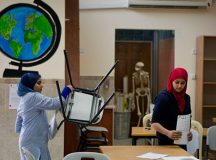Israel needs a revolution in how it thinks about foreign relations. To meet huge external challenges it needs a global web of good relations, but the resources available to the government are limited. The gap can only be filled by Israel’s civil society.
Today, the geopolitical world is flattening at an unprecedented pace. Many more players across nations are interconnecting in all areas of society. International affairs are no exception: non-governmental organisations (NGOs), corporations, and individuals are connecting across borders more than ever before, setting agendas and driving the way resources are allocated. In this reality, the capacity of an emerging global leadership class to catalyse change is often more potent than that of governments.
In many instances, the shifting international landscape has turned the conventional political-diplomatic logic on its head. In the past, political and economic systems used to be much more stable. Major players reigned for long periods of time and the ‘rules of the game’ were relatively well known. Then, it was easier to identify the ‘rising stars’ and to seek their attention and affection. Today, economic and technological developments have changed the rules of the game, creating new ways to accumulate power, and dramatically broadening potential sources of emerging leadership. In extreme cases, internal instability within nations makes betting on the emerging leadership impossible.
By contrast, states still tend to conduct their international affairs in a top-down, centralised manner, with foreign policies designed by a handful of policy makers and implemented by diplomats and embassies. The result is a structural mismatch. Traditional governmental systems find they are operating on a different bandwidth from the social movements, citizen activism, cultural transmissions, technological flows, and economic activities which increasingly impact on all aspects of national security.
While this era of unprecedented decentralisation poses new challenges to the security of all nations, for Israel, it is a strategic priority. Israel is no exception in facing trends that affect all developed and democratic nations. However, Israel is unique among these nations in also facing two monumental challenges: its proximity to the so-called ‘Arab Spring’, and the assault being waged on its fundamental legitimacy, fuelled in part by a massive, hostile campaign of propaganda.
The Arab Spring has ushered in chaos and the collapse of states in the Middle East. Major countries have broken down into players and sub-state units with distinct religious, geographical, cultural, and national identities. This development obstructs Israel’s ability to shape regional events by influencing powerful governing elites, rendering its arsenal of existing strategies largely useless.
In addition, Israel is being subject to an assault on its political and economic model by the so called Boycott, Divestment, and Sanctions (BDS) movement, which seeks its implosion. The BDS movement is made up of a globally spread network of individuals and NGOs. While its leaders seek the elimination of Israel as a Jewish state, promoting a ‘one-state solution’ to the Israeli-Palestinian conflict, the movement has been effective at also harnessing the support of critics of Israeli policy, even those that believe in its right to exist.
These campaigns have not yet resulted in significant economic damage, nor is economic damage their immediate goal. Each such campaign – for example to divest university funds from Israel on college campuses or to pressure celebrities to cancel appearances in Israel – tarnishes Israel’s name, effectively branding Israel as a pariah state. Drawing upon the campaign against apartheid South Africa as inspiration, the movement seeks to delegitimise Israel internationally.
Against the backdrop to these challenges, Israel also faces a situation in which traditional alliances and bastions of support threaten to recede, with the centre of gravity of global power shifting eastward, to new areas beyond Israel’s traditional base of support. The US is in a state of internal economic and political crisis that looks set to continue for the foreseeable future, continuing the erosion of its leadership position. Other nations are rising around the world – most prominently China, Russia and India, but also countries like Brazil and South Africa – where Israel has weaker relations.
Additionally, Israel’s relations with the Jewish Diaspora – its core source of economic, political, and moral support – are showing signs of strain. Israel’s continued control over the Palestinian population has turned it from a force of unity among Jews to a divisive issue. More broadly, the traditional mediators of the relationships have lost their efficacy. The days when a representative of the government of Israel or of the Jewish Agency would communicate with a few leaders of world Jewry to shape the relationship are long gone. Today, trends in Israeli-Diaspora relations are also forcefully shaped by an increasingly diverse Jewish public that is often not affiliated with traditional institutions. For example, the passion with which Diaspora Jewry embraced the cause of Israel’s ‘Women of the Wall’ to secure equal rights for women to hold prayer services at the Western Wall caught the traditional custodians of the relationship by surprise, and lacking the capacity to establish a real dialogue.
The common storyline here is of rapid proliferation of actors that shape strategic issues critical to Israel. Israel’s political and diplomatic institutions were designed to navigate a far more centralised world, and to maintain the key relationships necessary to influence it. Today, the task of positioning Israel globally to secure its foreign policy goals greatly exceeds the capacity of its institutions.
Bringing about the needed revolution in Israel’s global relations requires a number of key steps. First, Israel should develop an authentic vehicle through which to build values-based partnerships with the myriad of individuals and organisations driving global change. Israel must make a resource backed, distinct and credible commitment to addressing acute needs of humanity, particularly at the ‘bottom of the pyramid,’ among the world’s poorest populations. Structurally, this means harnessing government, business, and civil society to address global needs in areas where Israel can make a unique contribution – such as on food, water, and energy security in arid areas. It means being able to ‘tell the story’ and get credit that comes with such a contribution.
If the delegitimisation of Israel creates a ‘legitimacy deficit’, such activities will contribute to a ‘legitimacy surplus’, by creating the platforms upon which countless relationships are created. Almost every story of success in foiling BDS campaigns revolves around a personal relationship that inspired someone within the organisation facing BDS pressure to take a principled stand.
The more Israel is associated with a disproportionate contribution to solving humanity’s greatest challenges, the more difficult it will be for absurd accusations – such as Israeli soldiers harvesting organs of Haitian citizens in the context of disaster relief efforts – to get a hearing. With the influence of individuals and organisations increasingly shaping global affairs, Israel’s ‘legitimacy surplus’ is critical.
Second, Israel should view the transformative events taking place across the Arab world as an unprecedented opportunity to engage differently in the region. While in the past Israel used to deal with Arab governments, engaging a very limited band of people, the weakening of centralised control creates greater potential to engage civil society institutions, such as an Arab press which is more decentralised and freer.
Israel can cultivate a web of relationships between its civil society and the civil societies of the Middle East by working together to tackle regional challenges. The present humanitarian crisis in Syria offers a case in point. Israelis have helped Syrian refugees in Jordan, and many seriously wounded Syrians have been treated in Israel. As the humanitarian challenges in the Middle East rise, Israel’s ability to provide assistance grows as well. While there are not likely to be immediate political dividends, the connections forged represent Israeli inroads into regional civil society, the opportunity to better understand the changing region, and the potential to amplify Israel’s capacity to positively impact its neighbours.
Especially with regard to Israeli-Arab relations, it remains imperative for Israel to demonstrate an authentic commitment to peace with the Palestinians, even though an ‘end of conflict’ deal currently appears elusive. But while progress with the Palestinians is a critical factor in Israel’s global standing, ideological opposition to Israel’s very existence would endure even if the conflict were resolved, with the campaigns against Israel drawing upon other issues. Addressing the conflict, therefore, is necessary but not sufficient for securing Israel’s future global standing.
Third, Israel must engage with the emerging global leadership class. This includes leaders, from businesses and non-profits, as well as government. What this class of individuals have in common is that they are extraordinarily global and interconnected, and are often organised around pressing transnational challenges such as food, water or energy security, as opposed to institutions such as political parties. While power shifts more quickly than ever before, the challenges are likely to remain, and those that are leading in dealing with them will rise.
Fourth, Israel must rethink the platforms for foreign relations and re-calibrate its geographic areas of focus. As mentioned, embassies are no longer as effective in a world where governmental power is in relative decline. Instead, institutions such as universities, museums, think tanks, research institutes, and hospitals have important potential to nurture high-quality relations around the world. A key area of priority must be engaging with budding civil societies of emerging nations. Today, Israel is over-invested among the declining powers and under-invested among the rising powers.
Finally, Israel must decentralise its relations with the Jewish Diaspora. The number of potential ‘touch points’ between the State of Israel – its government and society – and Diaspora Jewry have increased exponentially. The traditional approach that emphasised relations among institutions must evolve to encourage direct relations between communities, organisations, and individuals. The traditional covenant, which emphasised a ‘blood for money’ paradigm of Diaspora political and economic support in exchange for Israeli physical sacrifices, must give way to new partnerships grounded in mutualism and shared values. There are a number of innovative programmes that seek to connect Jews in Israel and around the world. There is room for many more, and especially programmes that appeal to individuals that are disaffiliated from traditional communal institutions. It is time to articulate a core, shared project of the Jewish people for our age: working together to make a unique, significant and indelible contribution to humanity aligned with the logic ofTikkun Olam (repairing the world).
In summary, the world of Israel’s international affairs has been transformed. The quantity and quality of relations that must be developed and sustained is far beyond the capacity of government. In this changing environment, positioning Israel among the family of nations and communities of peoples requires a new approach. The success of this approach rests on Israel’s ability to cultivate a resilient global web of relationships that are essential for its future security and prosperity.





































